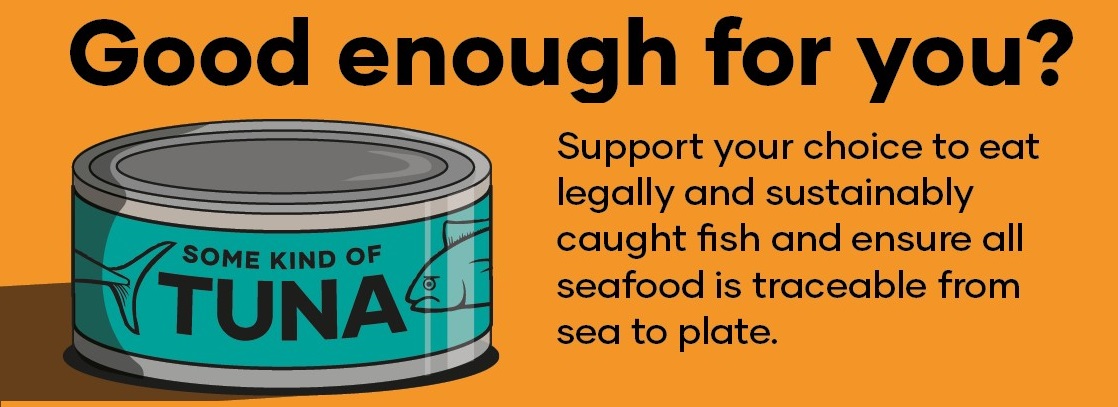The Environmental Justice Foundation (EJF), Oceana, The Nature Conservancy and WWF are working together to promote EU leadership in improving global fisheries transparency and governance to end illegal, unreported and unregulated (IUU) fishing.
When you buy a tin of tuna, do you really know what you’re getting? Perhaps you’ve wondered whether it’s sustainable, but found no useful information on the label?
Alexandra Cousteau is wondering the same.
There’s a loophole in EU law. While fresh fish has to be traced from sea to plate, processed fish does not. So while we’re given information about products such as cod fillets, we’re left in the dark when it comes to processed products such as tinned tuna or fish fingers. This means that, despite your best intentions to eat sustainable fish, you might be buying products that come from illegal fishing. This is undeniably a key issue considering the sheer amount of processed products that are consumed yearly, for example in terms of quantity, 97% of the purchased tuna and 82% of the purchased sardines in France in 2018 were canned products.
This year, the EU will decide on whether to make our seafood system more sustainable by applying the same traceability rules to both fresh and processed fish. Exercise your right to eat sustainably by asking Annick Girardin, Minister of the Sea in France, to support tracing both fresh and processed fish from net to plate and to stop catches from going missing.

Seafood traceability and counting what we take out of the sea in the EU
What is traceability and why do fishers need to report what they catch?
A traceability system tracks a product along each step of the supply chain from its origin to the point of sale and ensures that no information is lost along the way. To make sure this data is correct, and to help scientists assess what is taken out of the sea, it is crucial that fishers accurately report what they catch.
Why is traceability and counting fish catch important?
When seafood is traced properly, we know where it comes from, who caught it and how it was caught. Armed with this information, we can make responsible consumer choices and help prevent illegally sourced seafood from entering the European Union’s market. At the same time, this can support sustainable fisheries as well as reduce pressure on fish populations.
To make sure our marine resources are well managed, it is crucial that scientists have accurate data to assess the status of EU and international fish populations. Such scientific evaluations have been crucial to the EU’s efforts to increase fish stocks, for example, in the Atlantic. To inform these assessments, fishers need to count what they catch. Without strict rules on fish catch reporting we risk that illegal fish ends up on consumer’s plates, leaving enormous amounts of fish unreported. Consequently, this would undermine the positive efforts made by the EU and its fleet to manage fisheries sustainably over the past decade and have serious consequences for overfished species
How can we trace seafood?
Seafood supply chains can be long, complex, and sometimes convoluted. Yet traceability can be achieved using technologies that are readily available, such as barcodes and digital systems.
So, what is the problem?
The European Commission proposes that all fish catches should be counted and the same traceability rules should apply to both fresh and processed seafood. Yet some EU Member States and a number of Members of the EU Parliament do not agree. They argue that rules already exist to trace processed seafood under the Food Safety Regulation. However, this legislation does not require suppliers to provide consumers with the information they need to make informed choices, such as the species of fish they are buying, or where and how it was caught.
In June, EU Fisheries Ministers, including French Minister Annick Girardin approved a proposal that would legalise the misreporting of EU fish catches. Their proposal is to increase the allowed margin of error when EU fishing vessels estimate and report their catches. If adopted, this could result in catches of individual fish species being grossly underreported and lead to large amounts of EU catches being omitted from the EU fleet’s records, rendering fisheries control efforts ineffective.
Legalising the misreporting of EU catches would have serious consequences for crucial fish populations that are already overfished, close to home in the Atlantic such as mackerel, but also for vulnerable tuna species in the Indian Ocean, where France is fishing. Overall, these measures would put food security at risk in developing countries and overseas territories.
France is one of the countries strongly pushing to legalise misreporting and weakening the existing rules. In fact, the European Commission recently called out the country for not controlling its international fishing fleet and for failing to report its catches properly. Instead of addressing the problem by ensuring that fishing vessels follow the rules, the French government proposes to legalise fraudulent catch reporting.
If the Council and the European Parliament continue to push to weaken catch reporting rules and to exclude processed seafood from the traceability system, it will keep the EU’s door open to the trade in unscrupulously sourced products.
Why does it matter?
The EU, as the world’s largest importer of fish products and as one of the biggest fleets fishing internationally, has the duty to ensure the sustainability of its seafood supplies. More than 60% of the seafood we consume is imported. Much of it is tuna and shrimp, species that are vulnerable to overfishing
Ask the French Minister of the Sea, Annick Girardin, to support your right to choose sustainable fish by requesting traceability for all seafood from net to plate and to oppose the legalisation of underreporting of catches.

The Environmental Justice Foundation (EJF), Oceana, The Nature Conservancy and WWF are working together to promote EU leadership in improving global fisheries transparency and governance to end illegal, unreported and unregulated (IUU) fishing.

